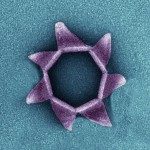Link to Pubmed [PMID] – 25355242
Mol. Ecol. 2014 Dec;23(24):6073-90
Freshwater ecosystems are critical but fragile environments directly affecting society and its welfare. However, our understanding of genuinely freshwater microbial communities, constrained by our capacity to manipulate its prokaryotic participants in axenic cultures, remains very rudimentary. Even the most abundant components, freshwater Actinobacteria, remain largely unknown. Here, applying deep metagenomic sequencing to the microbial community of a freshwater reservoir, we were able to circumvent this traditional bottleneck and reconstruct de novo seven distinct streamlined actinobacterial genomes. These genomes represent three new groups of photoheterotrophic, planktonic Actinobacteria. We describe for the first time genomes of two novel clades, acMicro (Micrococcineae, related to Luna2,) and acAMD (Actinomycetales, related to acTH1). Besides, an aggregate of contigs belonged to a new branch of the Acidimicrobiales. All are estimated to have small genomes (approximately 1.2 Mb), and their GC content varied from 40 to 61%. One of the Micrococcineae genomes encodes a proteorhodopsin, a rhodopsin type reported for the first time in Actinobacteria. The remarkable potential capacity of some of these genomes to transform recalcitrant plant detrital material, particularly lignin-derived compounds, suggests close linkages between the terrestrial and aquatic realms. Moreover, abundances of Actinobacteria correlate inversely to those of Cyanobacteria that are responsible for prolonged and frequently irretrievable damage to freshwater ecosystems. This suggests that they might serve as sentinels of impending ecological catastrophes.

